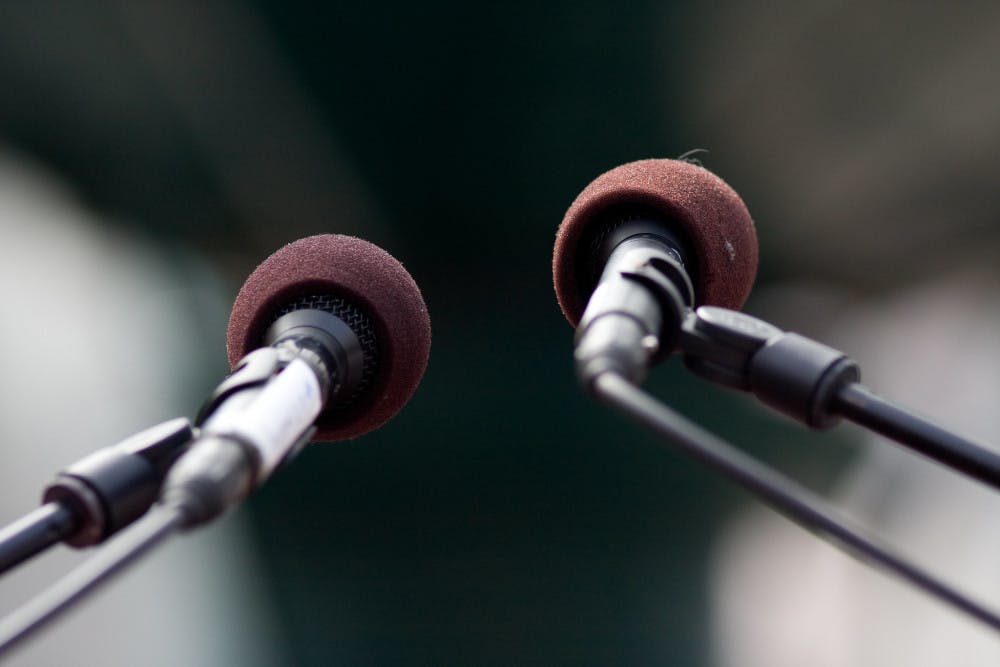The discussion over muting microphones affected the Washington gubernatorial debate.

By Sadie Fick
128. By one count, this is how many times President Donald Trump interrupted former Vice President Joe Biden or moderator Chris Wallace in the first presidential debate.
During the debate, Biden also interrupted dozens of times, and Wallace broke in at least 25 times to ask Trump to follow the debate rules.
Since this combative presidential debate, people have been talking, typing and tweeting over each other to say that disruptive candidates should have their microphones muted.
The discussion over muting microphones affected the Washington gubernatorial debate.
The gubernatorial debate was organized by the Washington State Debate Coalition, part of Seattle City Club.
Whitney Keyes, executive director at Seattle City Club, said organizing this year’s gubernatorial debate was a unique process because of the pandemic and how seriously the coalition had to consider muting candidates.
“We did agree if things got to that level where it’s not a constructive debate, our executive producer would be able to make that decision,” Keyes said.
The setup that would have made muting possible at the Oct. 7 debate was mainly for pandemic safety. The candidates were in separate rooms, so their microphones were the only way of their voice being heard, said Essex Porter, a reporter at KIRO 7 and one of the four moderators at the debate.
The only interruptions at the gubernatorial debate were time reminders or question clarifications.
Chris Roselli, a moderator of a 2019 Bellingham mayoral debate, said he thinks respectful debates are important.
“If you have candidates who have respectful discourse, then it encourages the voters to do the same,” Roselli said.
When candidates aren’t respectful, muting might help debates be more informative, said Derek Moscato, a public relations and journalism professor at WWU.
“The public has clearly indicated that they don’t appreciate an overabundance of conflicts, and they want the politicians to get down to business and talk policy,” Moscato said.
Moscato said he thinks controlling debates too much can stifle discussion and interaction, which is what engages the public, Moscato said.
“One thing about the debates that are happening, these days public interest is sky high,” Moscato said. “Whether the format is great or not … people are engaged with the political process.”
Seeing the candidates interact might be more important because voters can learn about the candidate’s policies elsewhere, said Moscato.
“Debates are one of the few venues for us to get to know what these politicians are like,” Moscato said. “Do we like them? Do we trust them? Do we want them to lead on all of these important issues?”
Seeing how candidates interact with others and deal with conflict can give perspective into them as people.
“It’s not a canned commercial, they’re not in front of their fans, it’s a very different dynamic,” Keyes said.
However, giving candidates space to challenge each other only works when the candidates are respectful of the debate rules and moderator.
“It’s very difficult for a moderator to make candidates behave,” Porter said. “Many of the critics of the moderation of the first debate don’t seem to understand [that].”
Rather than muting, Porter thinks having more town hall debates is a possible solution.
“Candidates will be rude to reporters, but they’re not necessarily going to be rude to voters,” Porter said.
At the final presidential debate on Oct. 22, each candidate had two minutes at the beginning of each 15-minute segment where the other person’s microphone was muted on a timer.
This format was a compromise between concerns about bias in muting and candidates having time to share their policies.
“I think it’s actually really smart, because then it takes the moderator’s bias out of the equation or, at least, a perception of a moderator’s bias out of the question,” Roselli said.
Roselli also likes this format because making sure everyone gets fair talking time is hard enough for moderators without policing a mute button too.
The final debate was much less disruptive than the first, but despite that, this format is not a sure fix for candidates disrespecting the speaking time of others.
“It’s frankly ineffective if the candidates are in the same room,” Porter said. “Muting the mics is pointless because the microphones are sensitive enough to pick up plenty.”





